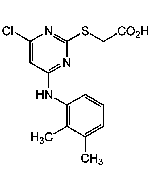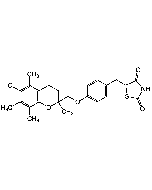Cookie Policy: This site uses cookies to improve your experience. You can find out more about our use of cookies in our Privacy Policy. By continuing to browse this site you agree to our use of cookies.
AdipoGen Life Sciences
GW501516
As low as
35
CHF
CHF 35.00
In stock
Only %1 left
AG-CR1-3641-M0011 mgCHF 35.00
AG-CR1-3641-M0055 mgCHF 80.00
AG-CR1-3641-M02525 mgCHF 240.00

| Product Details | |
|---|---|
| Synonyms | GSK-516; GW1516; Endurobol; 2-[2-Methyl-4-[[[4-methyl-2-[4-(trifluoromethyl)phenyl]-5-thiazolyl]methyl]thio]phenoxy]acetic acid |
| Product Type | Chemical |
| Properties | |
| Formula |
C21H18F3NO3S2 |
| MW | 453.5 |
| CAS | 317318-70-0 |
| RTECS | AI9105500 |
| Purity Chemicals | ≥98% (NMR) |
| Appearance | White to off-white solid. |
| Solubility | Soluble in DMSO (30mg/ml), dimethylformamide (30mg/ml), ethanol (10mg/ml) or methanol (30mg/ml). Sparingly soluble in water. |
| Identity | Identity determined by 1H-NMR / 13C-NMR. |
| InChi Key | YDBLKRPLXZNVNB-UHFFFAOYSA-N |
| Smiles | CC1=CC(SCC2=C(C)N=C(C3=CC=C(C(F)(F)F)C=C3)S2)=CC=C1OCC(O)=O |
| Shipping and Handling | |
| Shipping | AMBIENT |
| Short Term Storage | +4°C |
| Long Term Storage | -20°C |
| Handling Advice | Keep cool and dry. |
| Use/Stability | Stable for at least 2 years after receipt when stored at -20°C. |
| Documents | |
| MSDS |
 Download PDF Download PDF |
| Product Specification Sheet | |
| Datasheet |
 Download PDF Download PDF |
Description
- Potent and selective peroxisome proliferator-activated receptor (PPAR) δ agonist/activator with high affinity (Ki=1nM) and potency (EC50=1nM) for PPARδ and >1000 fold selectivity over PPARα and PPARγ. The peroxisome proliferator-activated receptor δ (PPAR δ) has emerged as an important regulator of lipid homeostasis and inflammatory signaling. Recent in vitro, in vivo and human clinical studies have highlighted a role for PPARδ activation in the prevention and treatment of insulin resistance and atherosclerosis.
- Antidiabetic compound.
- Shown to activate pathways initiated through exercise and was investigated as a potential treatment for obesity, diabetes, dyslipidemia and cardiovascular disease. Off-target high doses lead to tumor progression in rodents.
- Increases ABC A1 transporter expression and induces apolipoprotein A1-mediated cholesterol efflux in vitro.
- Increase serum HDL cholesterol and lowers small-dense LDL levels in obesity in vivo models.
- Reduces plasma triglyceride concentration.
- Increases expression of genes involved in lipid utilization, β-oxidation, cholesterol efflux and energy uncoupling, as well as apolipoprotein-A1 specific efflux of intracellular cholesterol, indicating the muscle tissue is an important target.
- Model compound for a new type of obesity therapeutic, as well as a selective pharmacological tool for understanding lipid metabolism.
Product References
- A selective peroxisome proliferator-activated receptor delta agonist promotes reverse cholesterol transport: W.R. Oliver, et al.; PNAS 98, 5306 (2001)
- Novel selective small molecule agonists for peroxisome proliferator-activated receptor delta (PPARdelta)-synthesis and biological activity: M.L. Sznaidman, et al.; Bioorg. Med. Chem. Lett. 13, 1517 (2003)
- The peroxisome proliferator-activated receptor beta/delta agonist, GW501516, regulates the expression of genes involved in lipid catabolism and energy uncoupling in skeletal muscle cells: U. Dressel, et al.; Mol. Endocrinol. 17, 2477 (2003)
- Activation of peroxisome proliferator-activated receptor delta induces fatty acid beta-oxidation in skeletal muscle and attenuates metabolic syndrome: T. Tanaka, et al.; PNAS 100, 15924 (2003)
- Peroxisome proliferator-activated receptor delta and gamma agonists differentially alter tumor differentiation and progression during mammary carcinogenesis: Y. Yin, et al.; Cancer Res. 65, 3950 (2005)
- Activation of PPARbeta/delta induces endothelial cell proliferation and angiogenesis: L. Piqueras, et al.; Arterioscler. Thromb. Vasc. Biol. 27, 63 (2007)
- AMPK and PPARdelta agonists are exercise mimetics: V.A. Narkar, et al.; Cell 134, 405 (2008)
- Peroxisome proliferator-activated receptor delta agonists inhibit T helper type 1 (Th1) and Th17 responses in experimental allergic encephalomyelitis: S. Kanakasabai, et al.; Immunol. 130, 572 (2010)
- Activation of PPARδ promotes mitochondrial energy metabolism and decreases basal insulin secretion in palmitate-treated β-cells: L. Jiang, et al.; Mol. Cell Biochem. 343, 249 (2010)
- Activation of peroxisome proliferator-activated receptor-{delta} by GW501516 prevents fatty acid-induced nuclear factor-{kappa}B activation and insulin resistance in skeletal muscle cells: T. Coll, et al.; Endocrinol. 151, 1560 (2010)
- The role played by the peroxisome proliferator-activated receptor-β/δ (PPARβ/δ) activator, GW501516, in control of fatty acid metabolism: a new potential therapeutic target for treating metabolic syndrome: J. Lee & W.Y. Chung; Endocrinol. 152, 1742 (2011)
- Peroxisome proliferator-activated receptor δ: a multifaceted metabolic player: L.A. Bojic & M.W. Huff; Curr. Opin. Lipidol. 24, 171 (2013) (Review)
- Harnessing the benefits of PPARβ/δ agonists: L.S. Mackenzie & L. Lione; Life Sci. 93, 963 (2013) (Review)
- Short-term administration of GW501516 improves inflammatory state in white adipose tissue and liver damage in high-fructose-fed mice through modulation of the renin-angiotensin system: D.C. Magliano, et al.; Endocrine 50, 355 (2015)
- Unraveling the Effects of PPARβ/δ on Insulin Resistance and Cardiovascular Disease: M. Vazquez-Carrera; Trends Endocrinol. Metab. 27, 319 (2016) (Review)
- Remodeling of metabolism and inflammation by exercise ameliorates tumor-associated anemia: R. Furrer, et al.; Sci. Adv. Immunol. 7, 37 (2021)







